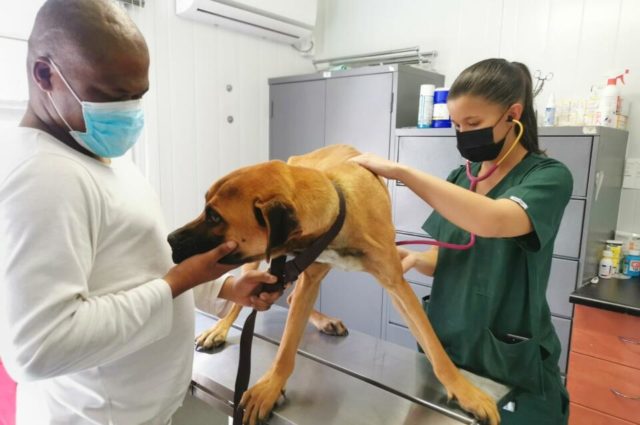The Kimberley CCS Clinic has been praised by community members and veterinary graduates.
THE KIMBERLEY CCS Clinic has been praised by community members and veterinary graduates as it is a “lifeline” for both animal lovers and graduates who may find themselves without work due to lack of experience.
The national Department of Agriculture, Land Reform and Rural Development implemented the programme in the Northern Cape at the beginning of 2016, in response to the need for veterinary students to complete their studies, which is similar to the community service done by medical graduates.
In 2016 there were only four veterinarians in Kimberley and two in Seodin.
With an annual budget of R1 million from the department and the Comprehensive Agriculture Support Programme (CASP), funds will be utilised for equipment, medicine and other consumables.
From 2016 to 2022, 10 veterinarians have completed their community service year and two are currently busy at the Kimberley CCS Clinic.
The Northern Cape has 37 veterinarians and seven more who need to complete their practicals. Among them is Kimberley-born Dr Simone Jacobs, who says that if it wasn’t for the programme she would most likely be an unemployed graduate.
She believes it gives new veterinarians the opportunity to be skilled before entering the workplace as fully qualified vets.
“I am home and enjoy the spoils of being home, like cooked, mom-made meals, laundry done and working close to home,” says Jacobs.
“I applied to Kimberley as my first option, knowing that not many would want to be here, but this is where I come from. So in a small way, I’m serving my community and gaining valuable experience.”
Northern Cape Department of Agriculture, Environmental Affairs, Rural Development and Land Reform spokesperson Zandisile Luphahla explained that the programme provides a unique opportunity for new veterinarians to develop their knowledge, critical thinking and problem-solving skills.
“The objective is to send veterinarians to under-serviced and difficult to access areas,” Luphala said.
Pet owner Chantal Douland has been using the services of the clinic for over a year and is very satisfied with the service she receives.
“The staff are friendly and assist me with dignity.’’
Douland was at the clinic to have her pit bull puppy vaccinated. She believes that the clinic offers a valuable service to community members who are unable to pay the costs of private veterinary care.
Ali Mohamed, who brought his sick pit bull to the clinic, was grateful as he believes it would have cost him a fortune had he gone to a private vet.
He praised the young staff for their kindness in treating his sick pets. “The service provided is not only affordable but clean and welcoming,’’ Mohamed explains.
Another pet owner added that she too would not have been able to afford veterinary care if it was not for the Kimberley CCS Clinic.
She has been using the clinic for over four years to keep her pets healthy and their vaccinations up to date.
“I paid R350 to have my female puppy sterilised, not even the SPCA charges that amount. I’ll bring my older dogs for sterilisation too as I can only afford to do one a month.’’
Luphahla explained that private veterinarians, welfare organisations and state veterinary services apply for the services of a “CCS” veterinarian from the department. Once these applications are approved, the students receive a list of available positions. He/she chooses 15 options and is randomly allocated to an establishment. The selection process is completed before the final practical year of study starts.
Veterinarians conduct farm visits and attend to animals in the communities on a call-out system. Farmers are encouraged to contact the clinic to request assistance from the veterinarians.
The clinic renders services to persons with a household income of less than R5 000/month, pensioners, communal farmers and child-headed households.
Proof of income is requested and must be shown when visiting the clinic.
The clinic also assists the SPCA and other welfare groups that deliver services to the community, as well as conducting outreaches to surrounding towns. They also participate in the bi-annual World Rabies Day, which will take place on September 28 this year.
Since January this year, 521 animals were vaccinated against rabies and other diseases at the Kimberley CCS Clinic.
The Province has two other similar clinics in Prieska and Seodin.
The clinics can be contacted at the following numbers:
CCS Kimberley – 0876300274 / 083 302 3716
CCS Seodin – 083 452 9877
CCS Prieska – 083 452 987
Office hours are from 7.30am to 4pm, with consultations starting at 9am. The public is encouraged to make an appointment before visiting the clinic.
No after-hours or weekend services are rendered.








